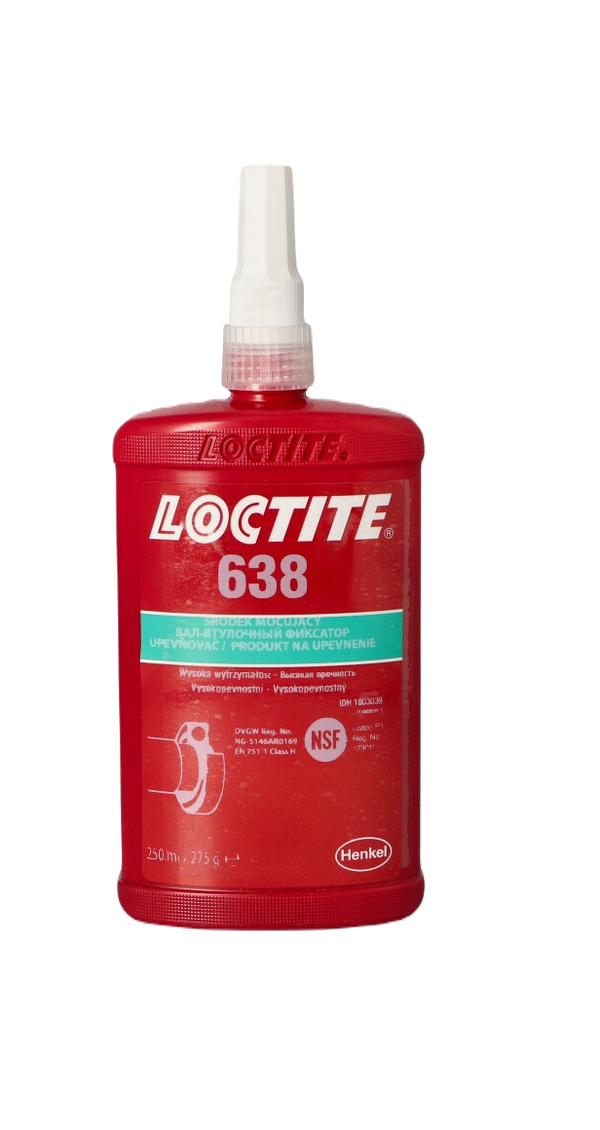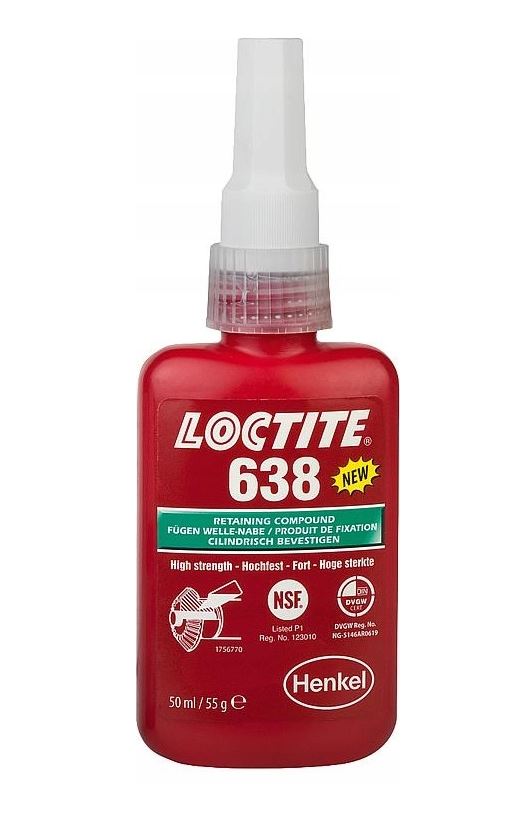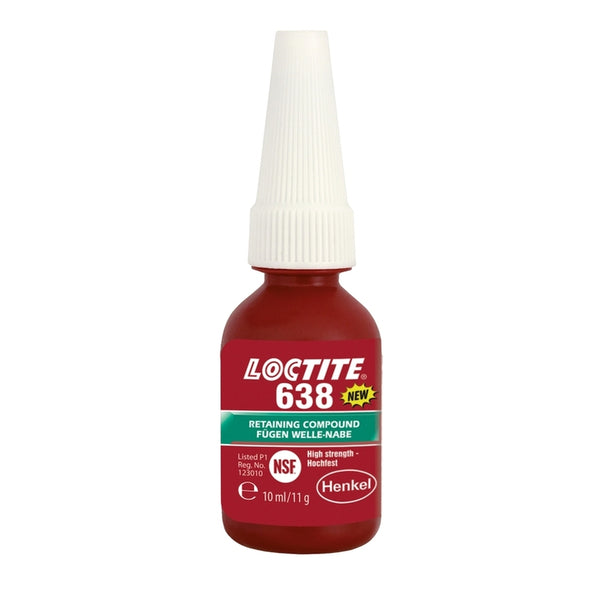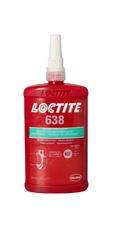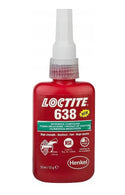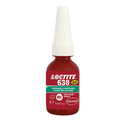LOCTITE® 638
Anaerobic fixing adhesive - hard-to-disassemble green, designed for gluing fitted cylindrical joints , in particular with narrow gaps up to 0.25 mm
The product cures when contact with air is cut off when it is placed between tight-fitting metal surfaces and prevents loosening
elements and leakages resulting from dynamic loads and vibrations. LOCTITE® 638™ provides high curing performance. It works not only on active metals (e.g. mild steel) but also on passive substrates such as stainless steel and plated surfaces. The product provides high parameters
high temperature serviceability and tolerance to light oil contamination.
Slight contamination of the surface by various oils, e.g. lubricating oils, technological fluids, anti-corrosion and protective fluids, is acceptable.
Applications Application
Perfect for parts that will be dismantled in the future, e.g.
- embedding rings in housings
- setting the sleeves on the shafts
- fastening of gears and pulleys
- For sliding fit parts
- other coaxial connections
Features and Benefits
- Tolerates light contamination, including industrial oils
- High strength on all metals, also on passive substrates (e.g. stainless steel)
- High temperature resistance
- It is ideal for fastening to shafts and gears, pulleys and coaxial components
- Complies with the German DVGW standard (EN 751-1): NG-5146AR0619
- P1 NSF Reg. No. 123010
- WRAS (BS 6920) approval: 0511518
Typical properties
| Technology | Acrylic |
| Compound | Dimethacrylate ester |
| Color Form | Green liquid |
| Fluorescence | Yes - under the influence of UV light |
| Ingredients | One-component |
| Viscosity | High 2500.0 mPa.s (cP) |
| Hardening | Anaerobic product |
| Hardening - option | Activator |
| Application | Coaxial fixing |
| Resilience | High |
| Relative density @ 23°C | 1.1 |
| Viscosity, Brookfield - RVT, 25 °C, mPa s (cP): Spindle 2, speed 20 rpm. |
2500 |
| Viscosity, cone/plate, 25 °C, mPa s (cP): Shear rate 129 s-1 |
2500 |
| Settling time | 10 minutes |
| working temperature | -55.0 - 180.0 °C |
| Shear strength, Steel | 31.0N/mm² (4500.0psi) |
| Time to full strength at 22 °C. steel stainless steel Aluminum |
12 hours 24 hours 72 hours |
Typical Curing Course
Curing speed depends on the material
The curing speed depends on the material used. The graph below shows the shear strength developed over time on steel pins and sleeves w
compared to other materials, tested according to ISO 10123

Curing speed depending on the gap
Cure rate is dependent on gap size Chart below shows shear strength developed over time on steel pins and sleeves
at various controlled gaps; tests according to ISO 10123

Cure speed depending on temperature
The curing speed depends on the ambient temperature. The graph below shows the shear strength developed over time at different temperatures
steel shafts and sleeves tested according to ISO 10123

Curing speed depending on the activator

Temperature strength
Durability tests depending on the temperature are presented in the chart below

GENERAL INFORMATION
This product is not recommended for use with pure oxygen and/or oxygen rich equipment; nor should it be used for installations with chlorine and other materials
strongly oxidizing.
Generally, this product is not recommended for plastics (especially thermoplastics that are prone to stress cracking)
Installation
- For best bonding results, clean all surfaces (exterior and interior) with LOCTITE® remover and allow to dry.
- If curing takes too long or if there are too large gaps, you can speed up the curing process by applying an activator to the surface beforehand.
- For slip fits, apply the product to the lead-in chamfer on the shaft and inside the sleeve and twist the parts together.
- For press-fit joints, apply the adhesive carefully to both surfaces and press-fit quickly.
- In the case of hot pressed joints, the fastened parts should be covered with an even layer of the product. If the hub is heated, apply the product to the shaft. If the shaft is to be cooled down before assembly, apply the product to
hub. If heating and cooling are used simultaneously, apply the product to the element to be cooled. Avoid condensation on cooled parts. - Joint parts should not be fully loaded until full strength is achieved.
Disassembly
- Unscrew the connector using hand tools.
- Heat the joint to approximately 250 °C if necessary. Disassemble while hot.
- If this temperature cannot be reached, heat to as high as possible and use power tools.
Cleaning
- Cured product can be removed with LOCTITE® solvent
or using mechanical treatment, e.g. with a wire brush
Storage
Unless otherwise indicated on the product label, the ideal way to store it is to leave it in closed containers in a cool and dry place. Optimum storage temperature: 8 °C to 21 °C.
Storage at temperatures below 8 °C or above 28 °C may irreversibly change the properties of the product.
Product title
Vendor
19,99 zl PLN | 24,99 zl PLN
Product title
Vendor
19,99 zl PLN | 24,99 zl PLN
Product title
Vendor
19,99 zl PLN | 24,99 zl PLN
Product title
Vendor

